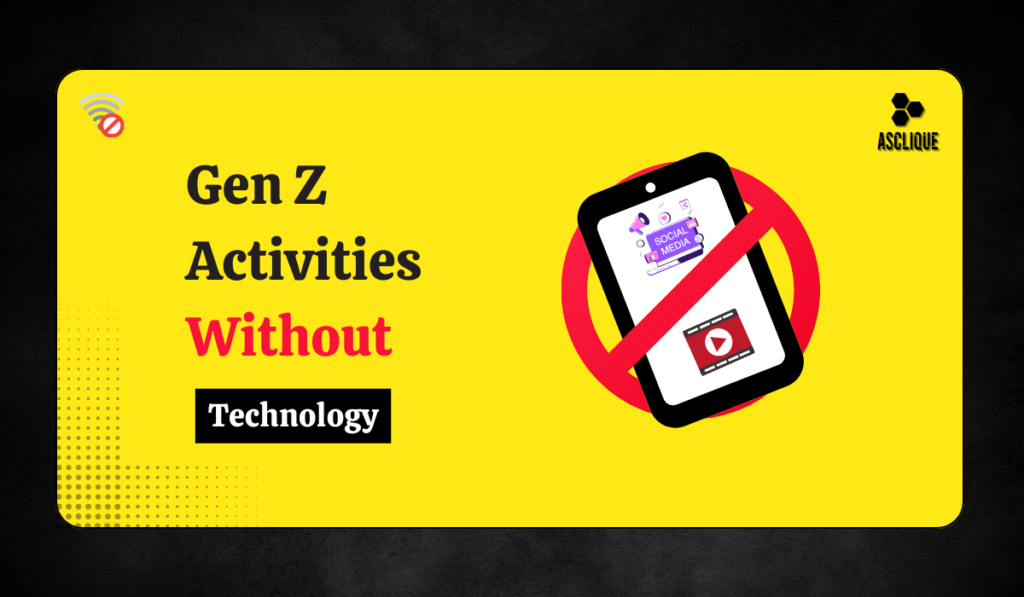In a world saturated with screens, Gen Z—the generation born around 1997 to 2012—is the first generation to have grown up with nothing but the digital age. Though they get a lot of praise for their technical skills, there is more and more worry about the effects of all that continuous screen time on skills in the outside world. The good news? There are more than enough Gen Z activities without technology that help develop communication, leadership, creativity, and practical life skills.
Why Gen Z Needs a Break from Tech
Teenagers spend 7 hours and 22 minutes a day on screens, excluding homework, as of 2023, Common Sense Media says. Excessive time spent online can cause sleep deprivation, anxiety, and reduced face-to-face interaction.
Stepping away from technology regularly isn’t about reducing screen time—it’s about creating room for activities that foster confidence, social intelligence, and hands-on knowledge.
What Are Gen Z Activities Without Technology?
These are activities that stimulate the mind and body without the use of smartphones, tablets, or the internet. Physical, social, or creative, it’s about being present and learning through experience.
It might be something as basic as going for a hike, preparing a meal from scratch, or learning to sew. These everyday activities have the potential to impart long-term skills and, in fact, even become a determining factor in career decisions.
Outdoor Tasks That Teach Responsibility
Gardening and Sustainable Living
Gardening promotes patience, responsibility, and environmental consciousness. As teenagers grow their own vegetables or care for a small plant garden, they experience firsthand what it means to live sustainably.
- Studies show that gardening decreases stress and enhances mood.
- It promotes planning, timing, and responsibility.
Volunteering in Community Projects
Volunteering for local clean-up campaigns, food banks, or old-age homes provides them with empathy and leadership. It makes Gen Z relate to society and enables them to witness the tangible outcome of their work.
- The University of Nevada conducted a study that revealed teens who volunteer regularly are 50% more likely to believe that they have a sense of purpose in life.
Creative Hands That Make Ideas Real
Drawing, Crafting, and DIY Projects
Art is not just self-expression—it creates concentration and problem-solving ability. Do-it-yourself activities such as knitting, origami, or DIY home decor projects challenge young minds to find and accomplish things without immediate digital reward.
- In a 2022 survey on Creativity in Youth, 68% of teenagers indicated creative activities kept them grounded when confronted with stressful circumstances.
Writing and Journaling
Writing develops emotional intelligence and critical thinking. Gen Z can apply journaling to work through emotions, monitor goals, or just journal their lives—without posting it all on social media.
- Daily journaling enhances memory and reduces stress.
Social Skills Start Without a Screen
Board Games and In-Person Meetups
The old board games such as Monopoly or Catan are even instructing negotiation, cooperation, and strategic thinking. More importantly, they build common ground—something social media tends to not even often create in a real manner.
- A study by Psychology Today determined that in-person social interaction has a 40% higher satisfaction rate than online communication.
Joining Debate Clubs or Public Speaking Groups
Public speaking enhances confidence and communication. Offline group activity helps Gen Z learn how to construct opinions, listen actively, and express ideas effectively—life and career skills.
Real-World Experiences That Build Future Careers
Cooking and Meal Planning
Cooking fosters independence, time management, and budgeting. Meal planning stimulates critical thinking—such as selecting inexpensive ingredients and considering nutritional content.
- According to a National Institutes of Health report, teens who cook regularly will be more likely to eat healthily as grown-ups.
Budgeting and Managing Finances
Paper budgeting or mock money exercises (such as hosting a garage sale) provide Gen Z with a fundamental understanding of managing money—something many learn too late in life.
Reading and Offline Learning Habits
Physical Books and Library Visits
Reading physical books enhances comprehension and concentration. Libraries also foster a culture of immersion learning, which is distraction-free from the pressures of online life.
- A study by the University of Stavanger discovered readers remember 25% more text from print books compared to screens.
Exploring Museums and Local History
Learning by doing in museums, galleries, or local heritage walks trains teenagers in a deeper sense of culture, history, and the broader world—an experience Google cannot compete with.
Helping Gen Z Unplug: What Parents and Educators Can Do
We can’t teach Gen Z to log off—we need to set the example of how and why. Here’s how parents and educators can bring about the change:
- Establish screen-free areas at home such as the dinner table or family room.
- Enforce “offline hours” during the evening or weekends.
- Teach membership in neighborhood clubs or workshops.
- Set an example. If adults use screens less, teens will follow suit.
Conclusion
There’s no question that technology is a part of contemporary life—but it shouldn’t dominate. Choosing Gen Z activities without technology is an effective way to help young people learn skills for the real world that they will need in work, relationships, and mental well-being. From gardening and public speaking to tokening or budgeting, these experiential activities have a lasting impact—and add balance to an otherwise overwhelming digital world.
FAQ’s
Why are Gen Z activities without technology important?
They enable young people to gain in-the-real-world abilities such as communication, problem-solving, and autonomy—habits screen time alone cannot encourage.
How can Gen Z reduce screen time effectively?
Begin with small changes such as no-tech zones, hobby time, and regular fresh-air activity.
What are some low-cost Gen Z activities without technology?
Journaling, volunteering, cooking, gardening, and visits to the library are cheap and skill-building.
Do these offline activities help with mental health?
Yes. Journaling, socializing, and outdoor activities reduce stress and improve mood.

